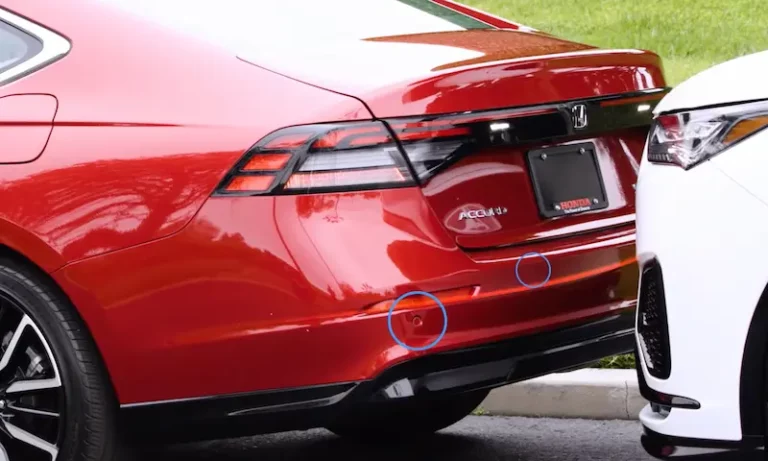Reverse parking sensors are essential safety devices that make parking your car a breeze. They work by emitting ultrasonic waves, detecting objects behind your vehicle, and alerting you with a beeping noise. However, there are instances when your sensor might not beep, leaving you puzzled and concerned about your safety while parking.
Don’t worry! There could be several reasons for this issue, and most of them are easily fixable. In this article, we’ll explore the common causes of your reverse parking sensor not beeping and guide you on how to address them effectively. Keep reading to ensure a safe and stress-free parking experience.
Common Problems with Reverse Parking Sensors
Beeping and Buzzing Issues
Sometimes, your reverse parking sensor may not beep as expected or may produce a buzzing sound. This could be due to a dirty or damaged sensor, as dirt and debris can interfere with its ability to work properly. Keep your sensors clean by periodically wiping them with a cloth to remove gunk and grime that may have accumulated from driving. If the sensor still malfunctions after cleaning, it could be damaged and may require replacement.
Sensor Failure Signs
Faulty wiring or improper installation is another common issue with reverse parking sensors. If your system has been recently installed, check the sensor placement to ensure it is correct. Otherwise, inspect the wiring for any loose connections or damaged cables. Sensor failure can also result from exposure to extreme temperatures or physical damage due to accidents or other incidents. Therefore, always be mindful of the wellbeing of your sensors and address any issues as they arise.
Error Codes and Warnings
Some vehicles come equipped with an onboard diagnostic (OBD) system that can help identify issues with your reverse parking sensors. If you suspect a sensor error, you could use an OBD scanner to access the Parking Aid Module (PAM) section to retrieve error codes and warnings. This process can guide your troubleshooting efforts, pinpointing the exact problem with your sensors and leading to a more efficient resolution. Remember to consult your vehicle’s owner manual for guidance on using the OBD system correctly.
By addressing any beeping, buzzing, or error code issues promptly, you can ensure that your reverse parking sensors continue to function effectively, enhancing your driving experience and safety.
Cleaning and Maintenance of Parking Sensors
Cleaning Guide
Keeping your reverse parking sensors clean is essential for their proper functioning. Dirt, dust, and debris can accumulate on the sensors over time, leading to malfunction and false readings. To clean the sensors, use a soft cloth or rag dampened with water or a mild detergent solution. Gently wipe the sensors to remove any dirt or debris, being careful not to apply too much pressure and damage them. Ensure that you clean all areas surrounding the sensors as well, as dust and dirt accumulation nearby can also cause issues.
Periodic Maintenance Tips
To maintain the optimal performance of your parking sensors, it is important to perform regular maintenance checks. Here are some helpful tips to make your sensors last longer and work efficiently:
- Inspect the sensors for dirt and debris every few weeks. Clean them as necessary to prevent buildup.
- Check the alignment of the sensors. If they appear to be misaligned, consult your vehicle’s owner manual or contact a professional mechanic for assistance.
- Monitor for any unusual noises or behavior from the sensors. If you notice any issues, have them checked by a professional to identify and address the problem.
- Apply a water-displacing spray like WD-40 to the sensor housings periodically to prevent rust formation.
- Keep the area around your vehicle clean to minimize the amount of dirt and dust your sensors are exposed to.
By following these simple maintenance tips, you can ensure that your reverse parking sensors work properly, helping you park safely and avoid potential accidents.
Repairing and Replacing Reverse Parking Sensors
DIY Repair Guide
If your reverse parking sensor is not beeping, the first thing you should do is determine the cause of the issue. Dirt or debris, poor wiring, or a damaged sensor can all lead to a malfunctioning sensor. Start by checking for dirt or debris on the sensors located in the rear bumper of your car. Clean them gentle using a soft cloth to avoid any damage.
Next, investigate the wiring to ensure it is secure and in good condition. If you find any loose or broken wires, you can attempt to reconnect or repair them using a screwdriver and electrical tape. Be sure to unplug the battery and follow safety procedures when working with electrical components.
Steps to Replace Sensors
If cleaning and checking the wiring does not resolve the issue, it may be necessary to replace the faulty reverse parking sensor. Begin by removing the sensor from the rear bumper using a screwdriver. You might need to apply gentle force or use a drill bit to carefully unscrew any retaining screws.
Once the damaged sensor is removed, install the new replacement sensor by following the manufacturer’s instructions. Ensure that the wiring connections are secure and properly placed. After installation, test the new sensor to confirm that it is functioning as intended.
Choosing Aftermarket Sensors
When purchasing a replacement sensor, you also have the option of choosing an aftermarket sensor. These can be more affordable than original equipment manufacturer (OEM) sensors and offer similar performance. When selecting an aftermarket sensor, pay close attention to compatibility, ensuring it matches the specifications of your car’s make and model.
When properly installed and maintained, your reverse parking sensor will provide valuable assistance in safely navigating tight parking spaces. By addressing any malfunctioning sensors as soon as you notice a problem, you can ensure the longevity and reliability of your parking assistance system.
Cost Consideration for Repair and Replacement
When your reverse parking sensor stops beeping, it can be frustrating and unsafe. There are several factors to consider when deciding whether to repair or replace the system. First, let’s look at some potential causes of the issue, such as dirty sensors or wiring problems.
Before making a decision about repairs, it’s essential to get a proper diagnosis from a mechanic or an auto technician. They can examine your vehicle and identify the exact problem with the reverse parking sensor system. Their expertise can help you avoid spending money on unnecessary repairs or replacements.
The cost of repairing or replacing the reverse parking sensor system varies widely. In some cases, a simple cleaning or fixing a wiring issue might cost you only a few dollars. On the other hand, if the problem is more significant, such as a damaged sensor, the price could be considerably higher. When it comes to the cost for a mechanic or auto technician, the hourly rate can range from $60 to $150, depending on your location and the complexity of the issue.
Additionally, you should also consider the cost of any replacement parts needed. For example, a single parking sensor can cost anywhere from $30 to $100. If multiple sensors need to be replaced, this can quickly add up. However, there are also aftermarket parking sensor kits available with prices ranging from $50 to $200, which may be a more cost-effective solution.
While dealing with a faulty reverse parking sensor, it’s crucial to weigh the costs, safety, and convenience of each option. Assess your budget and consult with your mechanic or auto technician to determine the best course of action for your specific situation. By carefully considering these factors, you can make an informed decision to keep your vehicle safe and functioning efficiently while staying within your financial means.
Final Thoughts
When it comes to your reverse parking sensor not beeping, it could be due to several factors. Firstly, ensure that the sensors are clean; accumulated gunk can affect their functioning. Troubleshooting issues related to reverse parking sensors can help you determine whether it’s a simple fix or a more complex problem.
In some cases, a quick reset of the control unit can solve the issue. However, if the issue persists, consult a professional to get it checked thoroughly, ensuring the safe functioning of your car’s reverse parking sensors.



